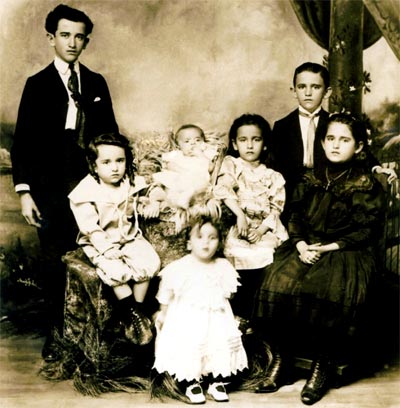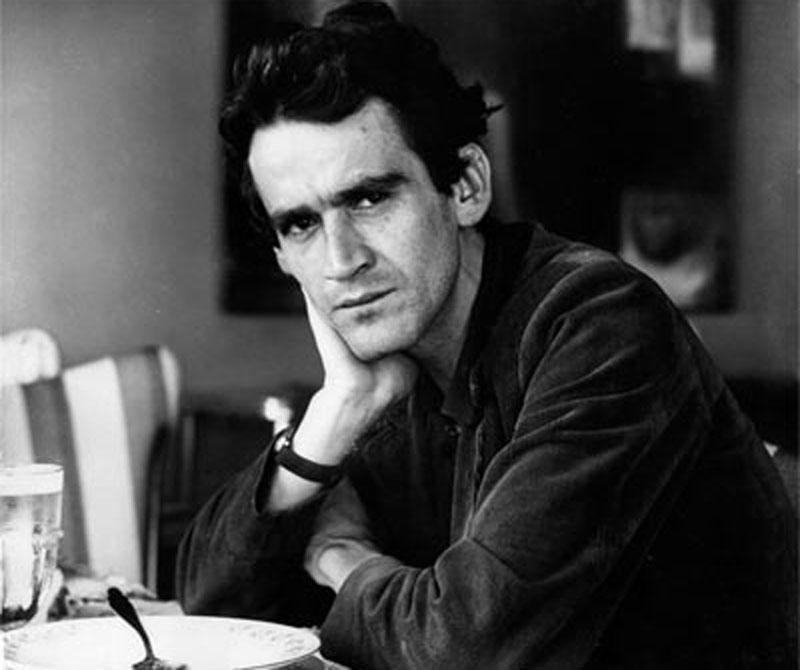|
Fernando González (writer)
Fernando González Ochoa (April 24, 1895 – February 16, 1964), was a Colombian writer and existentialist philosopher known as "''el filósofo de Otraparte''" (''The Philosopher from Elsewhere''). He wrote about sociology, history, art, morality, economics, epistemology and theology in a humorous, and creative style, in various genres of literature. González is considered one of the most original writers of Colombia during the 20th century. His ideas were controversial and had a great influence in the Colombian society at his time and still today. González work inspired Nadaism, a literary and cultural movement founded by Gonzalo Arango and some other writers, poets and painters that surrounded him. His ''Otraparte'' house in Envigado, is today a museum and the headquarters of the cultural foundation to preserve and promote his legacy. His house was declared a National Patrimony of Colombia in 2006. Biography Context González lived during the beginning of th ... [...More Info...] [...Related Items...] OR: [Wikipedia] [Google] [Baidu] |
20th-century Philosophy
Contemporary philosophy is the present period in the history of Western philosophy beginning at the early 20th century with the increasing professionalization of the discipline and the rise of Analytic philosophy, analytic and continental philosophy. The phrase "contemporary philosophy" is a piece of technical terminology in philosophy that refers to a specific period in the history of Western philosophy (namely the philosophy of the 20th and 21st centuries). However, the phrase is often confused with modern philosophy (which refers to an earlier period in Western philosophy), postmodern philosophy (which refers to some philosophers' criticisms of modern philosophy), and with a non-technical use of the phrase referring to any recent philosophic work. Professionalization Process Professionalization is the social process by which any trade or occupation establishes the group Norm (sociology), norms of conduct, acceptable wikt:qualification, qualifications for membership of the pro ... [...More Info...] [...Related Items...] OR: [Wikipedia] [Google] [Baidu] |
Existentialist
Existentialism is a family of philosophical views and inquiry that explore the human individual's struggle to lead an authentic life despite the apparent absurdity or incomprehensibility of existence. In examining meaning, purpose, and value, existentialist thought often includes concepts such as existential crises, angst, courage, and freedom. Existentialism is associated with several 19th- and 20th-century European philosophers who shared an emphasis on the human subject, despite often profound differences in thought. Among the 19th-century figures now associated with existentialism are philosophers Søren Kierkegaard and Friedrich Nietzsche, as well as novelist Fyodor Dostoevsky, all of whom critiqued rationalism and concerned themselves with the problem of meaning. The word ''existentialism'', however, was not coined until the mid 20th century, during which it became most associated with contemporaneous philosophers Jean-Paul Sartre, Martin Heidegger, Simone de Beauvoir ... [...More Info...] [...Related Items...] OR: [Wikipedia] [Google] [Baidu] |
Medellín
Medellín ( ; or ), officially the Special District of Science, Technology and Innovation of Medellín (), is the List of cities in Colombia, second-largest city in Colombia after Bogotá, and the capital of the department of Antioquia Department, Antioquia. It is located in the Aburrá Valley, a central region of the Andes Mountains, in northwestern South America. The city's population was 2,427,129 at the 2018 Colombian census, 2018 census. The Metropolitan Area of Medellín, metro area of Medellín is the second-largest urban agglomeration in Colombia in terms of population and economy, with more than 4 million people. In 1616, the Spaniard Francisco de Herrera Campuzano erected a small indigenous village (''poblado'') known as "Lawrence of Rome, Saint Lawrence of Aburrá" (''San Lorenzo de Aburrá''), located in the present-day El Poblado (Medellín), El Poblado commune. On 2 November 1675, the queen consort Mariana of Austria founded the "Town of Virgin of Candelaria, Our L ... [...More Info...] [...Related Items...] OR: [Wikipedia] [Google] [Baidu] |
Banana Massacre
The Banana Massacre () was a massacre of workers of the United Fruit Company (now Chiquita) that occurred between December 5 and 6, 1928, in the town of Ciénaga near Santa Marta, Colombia. A strike began on November 12, 1928, when the workers ceased to work until the company would reach an agreement with them to grant them dignified working conditions. After several weeks with no agreement, in which the United Fruit Company refused to negotiate with the workers, the government of Miguel Abadía Méndez assigned Cortés Vargas as military chief in the Magdalena department and sent 700 men from the Colombian Army to quell the strikers, resulting in the massacre of 47–2000 people (the range owing to the insufficiency of detailed historical records). U.S. officials in Colombia and United Fruit representatives portrayed the workers' strike as "communist" with a "subversive tendency" in telegrams to Frank B. Kellogg, the United States Secretary of State. The Colombian government ... [...More Info...] [...Related Items...] OR: [Wikipedia] [Google] [Baidu] |
Panama
Panama, officially the Republic of Panama, is a country in Latin America at the southern end of Central America, bordering South America. It is bordered by Costa Rica to the west, Colombia to the southeast, the Caribbean Sea to the north, and the Pacific Ocean to the south. Its capital and largest city is Panama City, whose metropolitan area is home to nearly half of the country's over million inhabitants. Before the arrival of Spanish Empire, Spanish colonists in the 16th century, Panama was inhabited by a number of different Indigenous peoples of Panama, indigenous tribes. It Independence Act of Panama, broke away from Spain in 1821 and joined the Republic of Gran Colombia, a union of Viceroyalty of New Granada, Nueva Granada, Ecuador, and Venezuela. After Gran Colombia dissolved in 1831, Panama and Nueva Granada eventually became the Republic of Colombia. With the backing of the United States, Panama seceded from Colombia in 1903, allowing the construction of the Panama Ca ... [...More Info...] [...Related Items...] OR: [Wikipedia] [Google] [Baidu] |
Thousand Days War
The Thousand Days' War () was a civil war fought in Colombia from 17 October 1899 to 21 November 1902, at first between the Liberal Party and the government led by the National Party, and later – after the Conservative Party had ousted the National Party – between the liberals and the conservative government. Caused by the longstanding ideological tug-of-war of federalism versus centralism between the liberals, conservatives, and nationalists of Colombia following the implementation of the Constitution of 1886 and the political process known as the Regeneración, tensions ran high after the presidential election of 1898, and on 17 October 1899, official insurrection against the national government was announced by members of the Liberal Party in the Department of Santander. Hostilities did not begin until the 11th of November, when liberal factions attempted to take over the city of Bucaramanga, leading to active warfare. It would end three years later with the signing o ... [...More Info...] [...Related Items...] OR: [Wikipedia] [Google] [Baidu] |
Civil War
A civil war is a war between organized groups within the same Sovereign state, state (or country). The aim of one side may be to take control of the country or a region, to achieve independence for a region, or to change government policies.James Fearon"Iraq's Civil War" in ''Foreign Affairs'', March/April 2007. For further discussion on civil war classification, see #Formal classification, the section "Formal classification". The term is a calque of Latin which was used to refer to the various Roman civil wars, civil wars of the Roman Republic in the 1st century BC. Most modern civil wars involve intervention by outside powers. According to Patrick M. Regan in his book ''Civil Wars and Foreign Powers'' (2000) about two thirds of the 138 intrastate conflicts between the end of World War II and 2000 saw international intervention. A civil war is often a high-intensity conflict, often involving Regular army, regular armed forces, that is sustained, organized and large-scale. C ... [...More Info...] [...Related Items...] OR: [Wikipedia] [Google] [Baidu] |
Catholic Church
The Catholic Church (), also known as the Roman Catholic Church, is the List of Christian denominations by number of members, largest Christian church, with 1.27 to 1.41 billion baptized Catholics Catholic Church by country, worldwide as of 2025. It is among the world's oldest and largest international institutions and has played a prominent role in the history and development of Western civilization.Gerald O'Collins, O'Collins, p. v (preface). The church consists of 24 Catholic particular churches and liturgical rites#Churches, ''sui iuris'' (autonomous) churches, including the Latin Church and 23 Eastern Catholic Churches, which comprise almost 3,500 dioceses and Eparchy, eparchies List of Catholic dioceses (structured view), around the world, each overseen by one or more Bishops in the Catholic Church, bishops. The pope, who is the bishop of Rome, is the Papal supremacy, chief pastor of the church. The core beliefs of Catholicism are found in the Nicene Creed. The ... [...More Info...] [...Related Items...] OR: [Wikipedia] [Google] [Baidu] |
Envigado
Envigado () is a city and municipality due South of Medellín, Colombia in the department of Antioquia Department, Antioquia. It is located in the Metropolitan Area of the Aburrá Valley. It borders El Poblado, Medellín to the north, Sabaneta, Antioquia, Sabaneta to the south, El Retiro, Antioquia, El Retiro and Caldas, Antioquia, Caldas to the east, and Itagüí to the west. Envigado is known for maintaining the traditions of the Paisa Region and for its architecture. It also has one of the highest standards of living in Colombia, and (according to the Colombian magazine Semana), has the country's lowest rate of what the magazine calls, “people with unmet basic needs”. Its recent history is closely associated with Pablo Escobar and the Medellín Cartel, Medellin cartel. Despite its connection with Escobar, the Aburrá Valley now has one of the lowest homicide rates in Colombia: 6 for every 100,000 people, Envigado is the hometown of the Colombian writer and philosopher Fer ... [...More Info...] [...Related Items...] OR: [Wikipedia] [Google] [Baidu] |
Nadaism
Nadaism (, meaning "Nothing-ism" in English) was a Colombian artistic and philosophical counterculture movement active from 1958 to 1964. Founded by writer Gonzalo Arango, the movement was influenced by nihilism, existentialism, and the works of Colombian writer and philosopher Fernando González Ochoa. Nadaism emerged partly in reaction to '' La Violencia'' and represented a Colombian expression of the avant-garde movements in the poetry of the Americas during the 1950s and 60s, such as the Beat Generation in the United States and the ''Tzanticos'' in Ecuador. The movement was largely anti-establishment and inspired works of literature, music, and film exploring Nadaist themes. The term ''nadaísmo'' is a portmanteau of the Spanish word "''nada''" (meaning nothing) and "Dadaism" (). Nadaísmo has sometimes been described as "Colombian dadaism", a "Colombian Beat Generation", or "Colombian Futurism". History The violent events in Colombia during the 1940s and 1950s, such as '' L ... [...More Info...] [...Related Items...] OR: [Wikipedia] [Google] [Baidu] |
Economics
Economics () is a behavioral science that studies the Production (economics), production, distribution (economics), distribution, and Consumption (economics), consumption of goods and services. Economics focuses on the behaviour and interactions of Agent (economics), economic agents and how economy, economies work. Microeconomics analyses what is viewed as basic elements within economy, economies, including individual agents and market (economics), markets, their interactions, and the outcomes of interactions. Individual agents may include, for example, households, firms, buyers, and sellers. Macroeconomics analyses economies as systems where production, distribution, consumption, savings, and Expenditure, investment expenditure interact; and the factors of production affecting them, such as: Labour (human activity), labour, Capital (economics), capital, Land (economics), land, and Entrepreneurship, enterprise, inflation, economic growth, and public policies that impact gloss ... [...More Info...] [...Related Items...] OR: [Wikipedia] [Google] [Baidu] |






